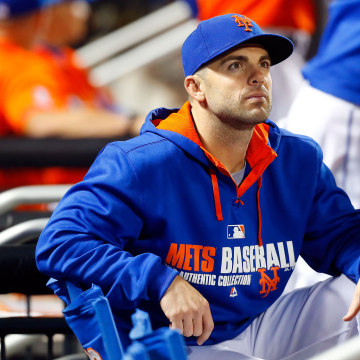Byung An and Jayoung Jung didn’t have tickets to the game, but because they live only one subway stop away, they figured they should check out the excitement of a World Series firsthand.
Growing up in South Korea, the husband and wife loved watching baseball, a sport introduced to Koreans in 1905 by an American missionary. Here in Queens, New York, where one in four residents is Asian, the Mets have become An and Jung’s adopted team, but there are some differences in baseball culture between the two countries, they said.
“This is more quiet,” explained An, comparing a typical American baseball game with one in Korea, where cheerleaders gyrate to music and fans face off in cheering battles. “It’s ‘Let’s go Mets, let’s go Mets,’ but mostly quiet.”
Not Saturday night, though, as scores of fans in orange and blue emptied out of the clogged confines of the Mets-Willets Point Station, hooting and screaming and chanting, “Let’s go Mets.” An and Jung stood frozen in the deafening noise, their hands clutching a few shopping bags they had carried with them, smiling as fans dashed left and right to join long lines for Game 4 against the Kansas City Royals, who won the Fall Classic on Sunday in extra innings.
Two of those fans were James and Kevin, brothers who declined to give their last name to NBC News. Both are Asian American and live in Elmhurst, a neighborhood not far from Citi Field that is home to many residents of Asian descent. The two lived in upstate New York before moving to Queens, and they were big Darryl Strawberry fans when the Mets won their last World Series in 1986, they said. Now, they say, their man is David Wright.


The Mets, these days, don’t have any Asian ballplayers, but over the years Japanese and Koreans have filtered through the ball club. Kevin, though, was optimistic about the future. “They’ve tried to embrace diversity, and time will tell what will happen going forward,” Kevin said as they waited in line to enter the stadium.
Wright, who was drafted by the Mets in 2001, is also An and Jung’s favorite player. But there’s always something special, the couple conceded, when someone from the place they were born and raised makes it to the big leagues. Chan Ho Park, a Korean who pitched briefly for the Mets in 2007, was one such example, An said.
“I really love to see the players from our country play here, because I feel they are our family,” Jung added.
While baseball is very popular in Korea and Taiwan, an island nation off the coast of China that learned the sport from the Japanese during colonial rule, it hasn’t gained traction as quickly in China after Mao Zedong banned it because of its Western roots during the cultural revolution in the 1960s and 1970s.
For its part, Major League Baseball has tried to reverse that trend, opening its first development center in China in 2009. Today there are three, an investment that has resulted in the Baltimore Orioles signing Xu Guiyuan in July, the first player from one of China’s MLB development centers to enter into a professional baseball contract.
Bryant Yu, a Dodgers fan who despite his team’s losing to the Mets in the National League Division Series was rooting for the Amazins, said that more could be done to get Asian Americans excited about baseball. Shouting over a loudspeaker broadcasting a live pregame show on SportsNet New York, Yu, who emigrated from Hong Kong when he was 10 and lived in Los Angeles before moving to the East Coast, brought up basketball’s popularity in China as a point of contrast to baseball.
“For example, the NBA is really big in Asia right now, especially China,” said Yu, who took a detour to Citi Field on the 7 train with his friend before heading to Penn Station. “Because of all the Chinese people, because of Yao Ming, because of Jeremy Lin, they’re really into basketball. That’s why the NBA is smart to expand into Asia and China.”
RELATED: Local Leagues Open Opportunities for Asian Americans on the Basketball Court
Unlike baseball, basketball, introduced to China by missionaries in the late nineteenth century, was never outlawed by Mao during the cultural revolution. In fact, it continued to enjoy popularity along with ping pong, according to a 2012 article in The Atlantic.
The hope now is that 19-year-old infielder Xu, whose minor league contract with the Orioles begins in 2016, can help engender a newfound enthusiasm for baseball in China.
“Xu has been working hard at the MLB Development Center and we hope he’ll be the first of many future major league players from China,” Orioles Executive Vice President of Baseball Operations Dan Duquette said back in July.



